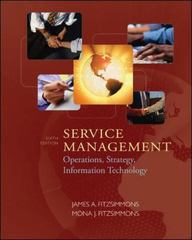Question
The Mystique of Leadership MiniCase The textbook defines leadership as the ability to influence employees to work toward organizational goals. The text also indicates that
"The Mystique of Leadership" MiniCase
The textbook defines leadership as the "ability to influence employees to work toward organizational goals." The text also indicates that there are different kinds of leadership styles that are effective at particular times and places and in the hands of certain leaders.
There is a mystique about the very word leadership. Leadership abilities may very well be in the eye of the beholder. Why are some individuals considered to be leaders? These individuals exhibit charisma, courage, charm, intelligence, and inspiration. Yet, people very close to the leader may know of many weaknesses possessed by the distinguished leader.
Prime Minister Winston Churchill is an example of a leader who was able to obtain the respect and loyalty of the British people during the six long years of war. Churchill had the ability to perk up the spirits of the people; his speeches, broadcast over the BBC, are considered classics. In Churchill's words, there was a strong, quiet confidence that Great Britain would prevail against all enemies and that this would be for all time referred to as "her finest hour."
Despite the horrendous burden of government weighing heavily on his shoulders, Churchill found time to be out among the people and when he did so, he was an inspirational model for those lucky Britons who actually saw him. Winston Churchill appeared to be the perfect example of a leader.
John Colville was a personal secretary to Churchill for a long period, including the years from 1939 to 1945, during World War II. He kept a diary during those years, and in 1985 Colville's notes were published by W. W. Norton and Company as the Fringes of Power, 10 Downing Street Diaries 1939-1955.Colville's references to Churchill make his diary compelling reading.
Colville was aware of how popular Churchill was with the public. It should be noted that Colville admired Churchill. Nevertheless, Colville witnessedat extremely close rangesome traits that showed Churchill to be very much a normal human with normal failings. In fact, some of Churchill's behavior would appear to be the opposite of that which would influence others to work toward the achievement of organizational goals. For example, there were times when Churchill could be extremely inconsiderate of those who worked for him. Churchill often worked until 2:00 or 3:00 in the morning and expected his staff to do the same. There is the example in which Churchill told his staff that they would need to rise at 5:00 in the morning so the prime minister and his party could be off to their next assignment by 7:00. The staff arose as told, but the prime minister proceeded to sleep very late without giving so much as a fleeting thought to notifying his staff of the change in his plans, causing his entire staff to lose some three hours of sleep. If the prime minister came to realize that he had been inconsiderate, he would never apologize. Instead, he would be overly friendly to those he had wronged; they were supposed to get the message.
Churchill, according to Colville, could be very petty and would hold grudges against political enemies far beyond normal lengths of time. In private conversation, Churchill would say frightful things about those political foes. If an idea came from the wrong person, Churchill would immediately criticize it. There were times when his staff and even Mrs. Churchill had to step in and show the prime minister the error of his ways.
In the early days of his prime ministership, Churchill got personally involved in far too many things, sending memos to numerous people in the government and the military on small matters that a good sergeant could have taken care of. There were days when the staff surrounding Churchill felt that the government was operating in a well-advanced state of confusion because of Churchill's apparent lack of administrative skill. Some felt that Churchill drank too much.
Despite the incidents that Colville reveals in his masterful diary, Churchill is still classified by most historians as a great leader. And Colvilledespite all he knows about the real Churchillalso concludes that he was a truly great man. The mystery of the secret of leadership remains. How many faults can one possess and still be effective at leading others? And can one be an effective leader in certain times and places? It should be noted that shortly after the war ended, the British voted against Churchill's party, and he left his position of prime minister.
Using concepts from this week's readings, discuss each of the following questions in your initial posting.
Using concepts from this week's readings, discuss each of the following questions in your initial posting.
Can you think of other well-known individuals who were perceived as great leaders, persons also known for personal faults or frailties that could have led to a loss of leadership? What made these individuals great leaders?
Which leadership style did the great leaders mentioned above exhibit? Autocratic style? Democratic style? Free-rein style? Explain your answer.
Be sure to paraphrase and then cite the source(s) of any information and/or ideas. Direct quotes are not permitted. Sources must be cited correctly. Remember if it is referenced, it must be cited in the text.
- Support your discussion with course concepts and at least one additional scholarly source from the FSW library databases
Step by Step Solution
There are 3 Steps involved in it
Step: 1

Get Instant Access to Expert-Tailored Solutions
See step-by-step solutions with expert insights and AI powered tools for academic success
Step: 2

Step: 3

Ace Your Homework with AI
Get the answers you need in no time with our AI-driven, step-by-step assistance
Get Started


